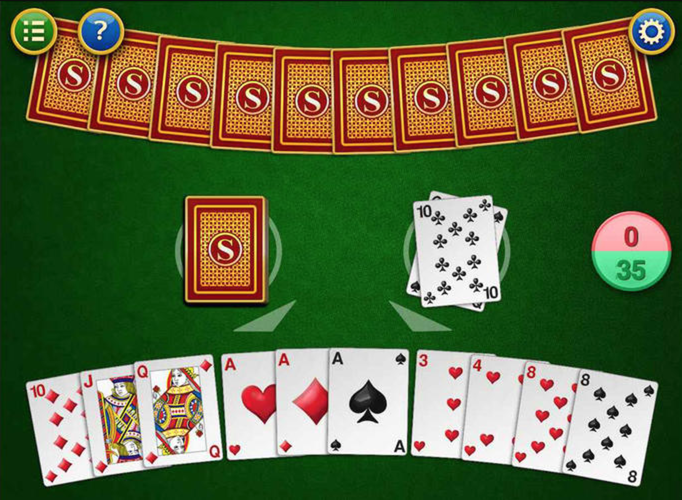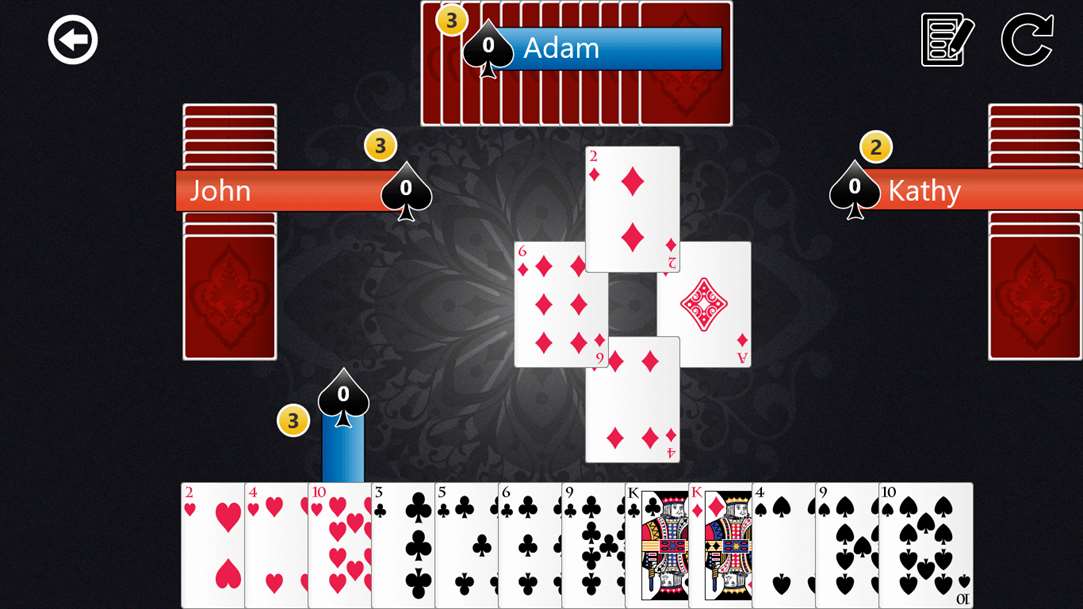Gin Rummy Online Free
There are a lot of games similar to Rummy. One of the most popular is Gin Rummy. Take a loot at the Gin Rummy rules page. You can see as well the varieties and differences of the game in some countries. Other popular card games to play in VIP Games: Hearts, Euchre, Crazy 8s. Play Gin Rummy Free! Online Gin Rummy with friends is the most popular, top rated, multiplayer card game in the world. It is a free ginrummy game also known as gin rumm, Knock, Rami, Remi, Rumi.
Rules
Gin Rummy online, free
Gin Rummy card game is a form of the rummy game where players place cards into sets and runs. The object of the game is to collect a hand where most or all of the cards can be combined into sets and runs and the point value of the remaining unmatched cards is low. Gin Rummy is one of the most popular forms of Rummy! Try to reduce the points in your 10-card hand to as close to zero as you can by forming melds and eliminating deadwood. Create a hand with lower points than your opponent and earn a higher game score. Play the popular card game Gin Rummy for free on Windows! Gin Rummy is a classic two player card game where you and your opponent compete to form melds of cards. Are you a new player? Try Easy mode and learn the game. Experienced players can enjoy the Medium and Hard modes.
Objective

The objective in gin rummy is to score points and reach 100, before your opponent does.
The basic game strategy is to improve one's hand by forming melds and eliminating deadwood. Gin has two types of meld: Sets of 3 or 4 cards sharing the same rank, e.g. 8♥8♦8♠; and runs of 3 or more cards in sequence, of the same suit. e.g. 3♥4♥5♥ or more. Deadwood cards are those not in any meld. In gin rummy aces are considered low and can form any set of aces but only the low end of runs (e.g. A♠2♠3♠ etc.). Q♠K♠A♠ is not a legal run in gin rummy. A player can form any combination of melds within their hand, whether it contains all sets, all runs, or both.
The deadwood count is the sum of the point values of the deadwood cards - aces are scored at 1 point, face cards at 10, and others according to their numerical values.
Dealing
Dealership alternates from round to round. The dealer deals 10 cards to both players, and then places the next card in the deck face up. This begins the discard pile. The face down pile is known as the stock pile. On the first turn, the non-dealing player has first option of taking the upcard on the discard pile or passing. If the non-dealing player passes the upcard, the dealer is then given the opportunity to take the upcard or pass. If the dealer also passes, the non-dealing player must draw from the stock pile. Once the first upcard has been drawn into a player's hand or both players have passed it, subsequently each player may choose from which pile to draw.

Gameplay
On each turn, a player must: draw either the (up card) top card of the discard pile, or the (face-down) top card from the stock pile, and discard one card from his or her hand onto the discard pile.

Players alternate taking turns until one player ends the round by knocking, going Gin, or until only two cards remain in the stock pile, in which case the round ends in a draw and no points are awarded. The game ends when a player reaches 100 or more points.
Knocking
A player may only knock if he has 10 or fewer points of deadwood. Knocking with 0 points of deadwood is known as going Gin.
To knock, the knocking player ends his turn by discarding as usual, announces that he is knocking , and lays his hand out with the melds clearly indicated and deadwood separated. The other ('defending') player is then entitled to lay out any melds in his or her hand and can then lay off any of his or her remaining deadwood cards that fit into the knocking player's melds, provided that the knocking player does not have a gin hand.
For example, the knocking player has a meld of three Kings. The defending player has a king as part of his deadwood. He can lay off that king, reducing his deadwood count by ten. The knocking player can never lay off his or her deadwood into the defending player's melds.
The knocking player then subtracts his deadwood points from the defending player's deadwood points. The result is the number of points the knocking player receives. An undercut occurs if a player knocks and the defending player's deadwood points are less or equal than the knocking player's. In this case the defending player receives an undercut bonus (25 points) plus the difference in deadwood points.
Offline Free Gin Rummy Games
Gin
If all 10 or 11 cards in a player's hand fit into melds and thereby the player has no deadwood, player receives a Gin bonus of 25 points plus any deadwood points in the opponent's hand. The defending opponent can only lay out his or her melds and cannot lay off any deadwood into the melds of an opponent that has declared Gin. A player can go Gin with a hand of three or fewer melds as long as all cards fit into a meld.
Scoring
Play Gin Rummy online, free
Aces are scored at 1 point, face cards at 10, and all other cards are scored at their numerical values. Points are scored in Gin for the following:
Play Gin Rummy online, free Without Registration
- Knock Points
- After a player knocks, and the lay offs are made, the knocking player receives a score equal to the difference between the two hands. For example, if a player knocks with 8, and the defender has 10 deadwood points in his or her hand after laying off, the knocking player receives 2 points for the hand.
- Gin Bonus
- After going gin, a player receives a bonus of 25 points plus the entire count of deadwood in his opponent's hand. There is no chance to lay off when a player goes gin.
- Undercut
- Occurs when the defending player has a deadwood count lower than or equal to that of the knocking player (this can occur either naturally or by laying off after a knock). In this case, the defender scores an undercut bonus of 25 points plus the difference between the two hands.